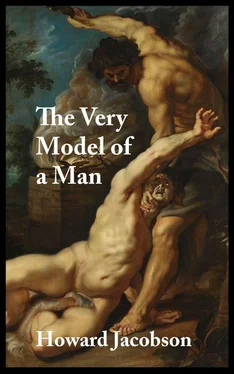‘There is less cruelty, Cain, in owning to the crime than in committing it.’
There was no cruelty, I protested, in its committal.
‘Thou wilt not dare to say there was kindness?’
Would I dare?
Towards him I did not feel anything that was cruel, I said. If there was cruelty in my heart, my brother was not the reason it was there.
‘Thou wilt not dare to say he merely came, by ill-chance, between thee and thine unhappiness?’
Would I dare?
Lord, my unhappiness was great, I said, and had many teeth. But I loved my brother and always wished him whatever the opposite is of harm.
‘Thou wilt not dare to say thou art a thing of love?’
Would I dare? I was a thing of love. The word itself had been my undoing from the moment I coined it. Love — it was giddying just pronouncing it. It did not even try to conceal its delusiveness. You tasted its hollowness before you tasted its fruit. That was its nature. That was its purpose. To put an illusion of substance around a sensation of emptiness. But did I dare to say this? No, I dared nothing. The argument with the Lord which I’d rehearsed a hundred multiplied by a hundred times did not proceed as I’d imagined it. He did not find my reasoning as incontrovertible in actuality as He had during practice. He took less time to weigh the gravity of what I said. Left no room, in His replies, for counter-retorts or controversy. And had the advantage of commanding a time and place that were His choosing, not mine.
As for the bird, here too He had the beating of me. Whenever I spoke, the raven fell into an attitude of derision: hopped from one leg to another, clawed its throat, or collapsed, as though its wings were broken, a misshapen thing with no life left in it, like my brother.
I dared nothing.
I am sorry, Lord, I said. I repent me, Lord, I said. I am nothing, Lord, I said.
A little of the tautness went out of the night. Infinitesimally, the hands that stretched the blackness loosened. There was contrition in the air, and God breathed it.
I postponed a bitter thought, for the hours of vacancy which were to come. It was: He is making me do with words what I refused to do with cereal. I have gained nothing, then, by my stubborness. Unless the loss of everything can be accounted a gain.
Another version, both more and less flattering to me, of that same thought: I am saying what I do not feel in order to escape the earth to which I have consigned my brother. If I can dissemble now, why did I not do it sooner?
I waited, cowed, thinking only of myself even as I denied myself… to hear my sentence.
‘A fugitive and a wanderer shalt thou be.’
How bad was that? It did not seem bad. I had to repress a sudden urge to laugh. What, do You call this a punishment, I wanted to cry out. Do You mean to pay me out with fugacy and exile, even though my transgression was itself a sort of flight? Do You suppose that turning me from Your sight will hurt me, when I have never once found blessing or consolation in Your Shining Countenance? Will You visit me with like for like and call it vengeance? My laughter was ready to tip over into tears. Was this the only justice my poor brother could look forward to? Was this all?
The realisation that had I been God I would have punished me more cruelly, emboldened me. It is hardly any time, I said, to You it must seem no more than the interval between sleeping and waking, since You expelled my mother and my father from eternal happiness. Out of a family of four, this is now three of us that You have exiled. Truly it will be said of You that You know no other way but to banish.
The raven twisted its neck and closed its eye. In the momentary extinction of its light I could just discern the outline of the bird, black as righteousness, more ragged than revenge. ‘Dost thou tempt Me to another way?’ it said.
I am in the great hand of Thy Mercy, Lord, I answered.
‘What wouldst thou encourage me to do — shed blood for blood? Slay as thou hast slain?’
Your sentence, Lord, I said, amounts to as much. If banishment from my family does not kill me, then some strong stranger’s arm, seizing the opportunity of my uncertainty and homelessness, surely will.
‘I will set a sign upon thee, Cain, so that whosoever killeth thee…’
I waited for Him to finish. Inadvertently, speaking only the fears to which I was prey, I had laid a trap for Him, simple enough though it was to detect — faggots of brushwood merely, camouflaging a lime pit beneath. But a God when he stumbles falls as clumsily as a bear.
These whosoevers, I inquired, that may not smite me unless they would pay sevenfold for their guilt — where will they come from if Adam and Eve and their one remaining son are the sole inhabitants of this earth which You alone worded out of chaos? Are there then others who suffer the same delusion of exclusivity that we do? Is there another Abel, perfuming the air with olibanum? Another Cain, on his knees with grief? How many, O Lord, are the children of Thy Choice?
The little tautness that had gone out of the night returned to it. The fingers that stretched the blackness stiffened.
‘Thou speakest jealously, Cain.’
I did not dare say: I acquired my jealousy from You.
‘Thou art jealous even of those thou canst not see.’
I did not dare say: How is that worse, Lord, than being jealous of those of whom You know the beginning and the end?
‘Thy jealousy will be a greater punishment to thee than thy banishment.’
I did not dare say: And there will come a time when the undeviating worship You jealously exact will sicken You; when the thousand times a thousand roasted rams will stink in Your nostrils; and the rivers of oil will drown every pleasure You once took in our vain oblations.
Where is the use of prophesying punishments? Man or God, we will die of too little devotion, or too much. Think punitively and there are no acquittals. Abel himself had not escaped, lying cradled in the earth for ever — lying cradled somewhere for ever — with the shame of being the first to inspire murderousness, and the shame of being the first to submit to it.
My own punishment, I told God, was already more than I could bear.
I was just beginning to understand it. The pleasure I had taken in my unknowing cunning, trapping a confession of moonlighting out of the Most High, had obscured the true import of His intentions for me. ‘I will set a sign upon thee,’ He had said, and only now did His meaning dawn on me. He would not emblazon a letter upon my brow — that would have looked too much like magic. His hatred of the necromantic arts saved me, likewise, from horns or tusks or other disfigurements spectacular enough to freeze the blood of an attacker or excite a dangerous curiosity in an audience. The sign He spoke of was itself a sign, a trick of speech to trick one who overvalued speech, a manner of speaking which, once spoken, could not fail to hold a dreadful fascination for me. I was marked, that was what it came to, marked out, marked against, marked down, a man of mark, a man beside the mark…
. . a marked man.
He knew my nature. How could He not? He knew that one who had named himself apart would never be able to resist the lure of actual, spatial, geographical separation; but the naming, this time, had been done by Him, making me a thing separate from everybody, and everything, but Him. I was His — that was what the sign amounted to. I was to experience the circumambience of His supremacy as no one else ever had. I was to comprehend the preponderance of His Word as no one else ever would.
Did I think I knew anything yet of the inescapability of the Lord? I knew no more of it than the stones I’d kicked on Abel knew. This was His promise, His lenience to me:
Читать дальше











